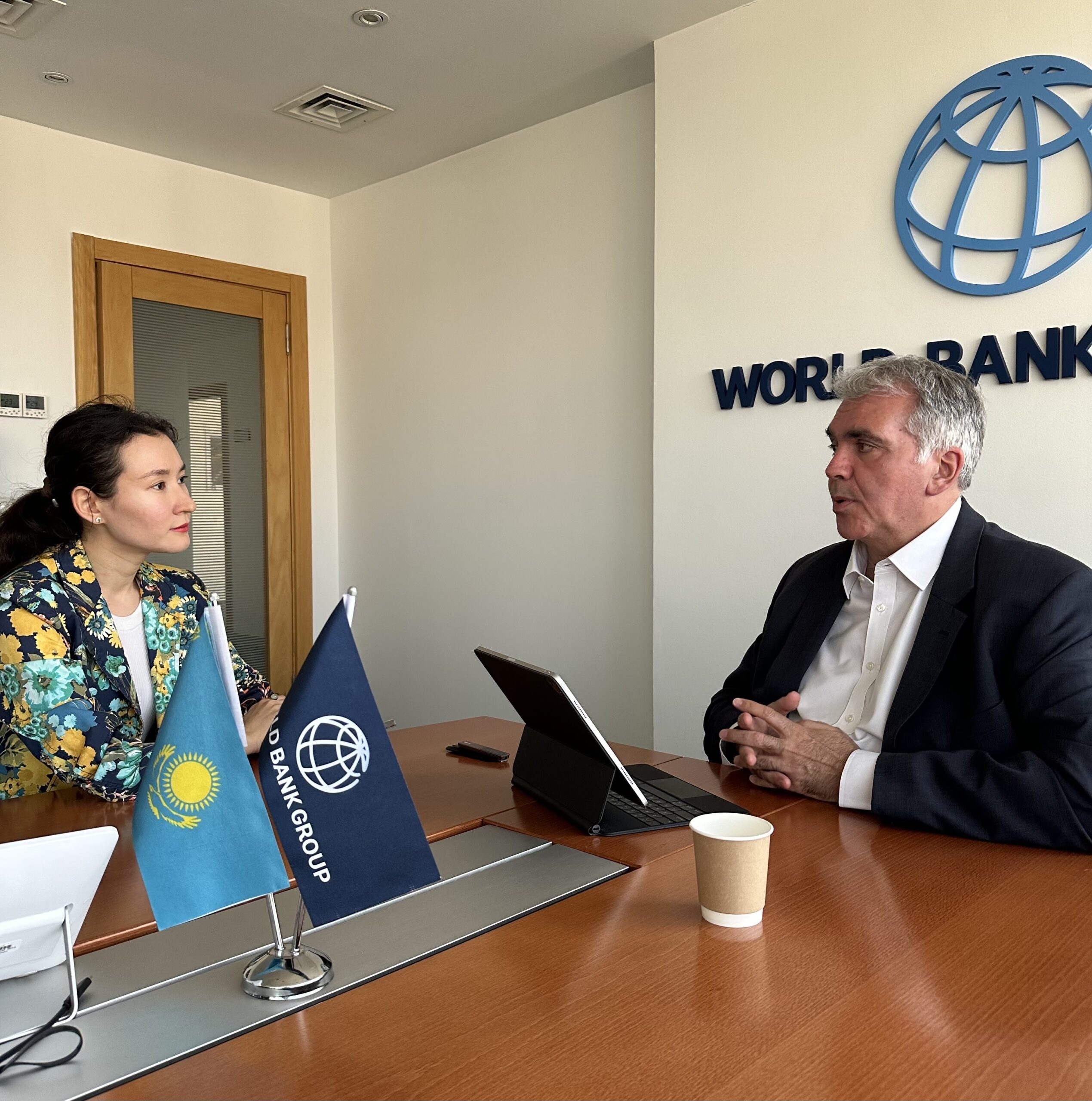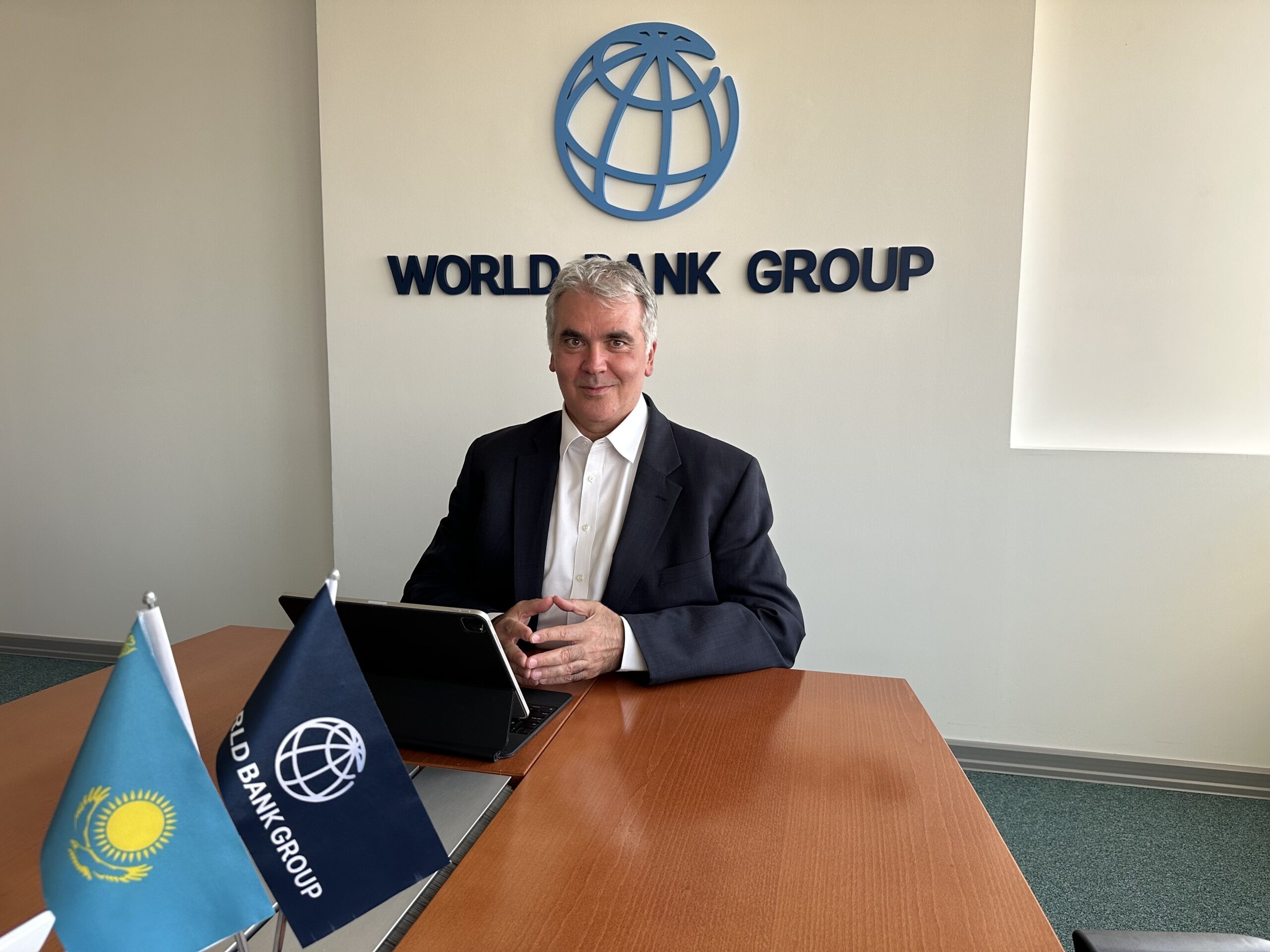ASTANA – Prioritizing education and structural reforms to boost the economy’s potential will be crucial to support Kazakhstan’s economic growth and would help tackle future challenges, said Ivailo Izvorski, the World Bank’s chief economist for the Europe and Central Asia region in an exclusive interview with The Astana Times.

Ivailo Izvorski (R) spoke with The Astana Times corespondent (L) on the sidelines of the Astana International Forum. Photo credit: World Bank press service.
“Central Asia has been the best-performing sub-region of Europe and Central Asia with 4% growth last year and this year, much higher than the other sub-regions of Europe and Central Asia,” said Izvorski.
The governments of Kazakhstan and Uzbekistan have in the past focused on extensive economic reforms to help unlock their countries’ economic potential and investment, which contributed to the growth, he said.
“I think this all makes it likely that when investors look at Central Asia, they’re going to look much more favorable to a region composed of strongly growing economies. This will be the case if trade linkages between them, the exchange of people and tourists grow. Therefore, this is going to be a much more favorable region for foreign direct investment. It would benefit Kazakhstan and would also benefit other countries in the region,” said Izvorski.
Diversification of economy
A more diverse asset base – that is, much better education and economic institutions – is key to sustaining strong growth. Diversifying exports should not be the goal: but diversifying the structure of national wealth by raising human capital, boosting private investment, and strengthening economic institutions should be.

Ivailo Izvorski. Photo credit: World Bank press service.
“The country is still very much dependent on exports of commodities, there’s been very little diversification, you could say. There’s still a large share of state-owned and state-connected enterprises. The competition regime is not what needs to be to encourage new businesses, the new vibrant Kazakhstan to emerge,” he said.
The lack of middle-sized enterprises suggests that prospects for small enterprises to expand is modest. By harnessing the private sector Kazakhstan’s progress will continue, he said.
“The country has what we may call the missing middle enterprises: there are a lot of small enterprises, there are some big enterprises and not too many medium-size enterprises. Because as they start to become medium-sized enterprises, they disappear. The environment is not favorable for their development. They cannot win against large state-owned or state-connected enterprises. So these are major challenges that prevent private investment in many of the countries,” said Izvorski.
Creating space for private sector activity and incentivizing policies supporting private enterprises would help to drive the nation’s economic growth.
“The government should give more economic freedom to enterprises to develop, should enforce a competitive regime that levels the playing field for both private and public enterprises, should reduce burdensome business regulations that make it difficult for private enterprises to grow,” he said.
Investment in human capital
Izvorski stressed that investing in education and raising human capital is an important factor in determining the extent to which Kazakhstan could advance in terms of its development.
“As countries grow, towards high income, the level of education increases, improves. And we need to see these changes in Kazakhstan to ensure that the country is indeed going to grow to high income,” he said.
Development cannot happen without a good education, so Kazakhstan should prioritize human capital investment to help unlock the growth potential of the country for decades to come.
“When you’re so close to high income, you need much more vibrant, real businesses that are not necessarily in commodities. These businesses need smart people, people with better education. Therefore, if you don’t have smart people to do innovation, to run these innovative businesses and connect to the rest of the world, it’s going to be very difficult,” he said.
Connectivity with Central Asia
Izvorski also discussed the importance of Kazakhstan’s comprehensive partnerships with other Central Asian states and their pivotal role in enhancing the efficiency, agility and strength of the regional economy.
“That has to be supplemented by increasing trade, increasing exchange of people, students, visitors and others so that there is tighter economic linkages between the countries and increased participation in the value chains. Linking to these value chains across the region is very important,” said Izvorski.
He also addressed the Middle Corridor and the expansion of trade routes with other countries in the Caucasus and Central Asia and its impact on Kazakhstan’s development.
“While it is very useful, obviously, for the global economy, for China and for Europe, unless Kazakhstan, Tajikistan and most of the countries of Central Asia are able to put goods on this corridor, it’s not going to be a of great use to them other than as a transit corridor for the global economy and in general for the world,” he said.
Green transition
Kazakhstan has been implementing small and medium-sized solar and wind projects over the past three or four years “but to achieve carbon neutrality, these have to really be scaled up,” said Izvorski.
The World Bank has expertise in large-scale renewable energy system development.
“The World Bank has experience in scaling up both solar and wind projects and has done this for Uzbekistan along with many other countries. The scaling up was truly a broad project that’s called Scaling Solar,” said Izvorski.
The country’s existing fossil fuel-based energy sector is characterized by an aging infrastructure and significant energy losses, according to him.
“A lot of the existing equipment is outdated and needs to be fixed. At present, the outdated equipment in generation and transmission creates losses. Therefore, there has to be opportunities to renew these transmission lines, renew the equipment as the green transition advances and the World Bank can help on that,” he said.
“We have discussed proposals of how we can help scale up on the solar side,” said Izvorski with projects that will support the country’s goals on emissions reductions, while increasing clean energy access and energy security.
